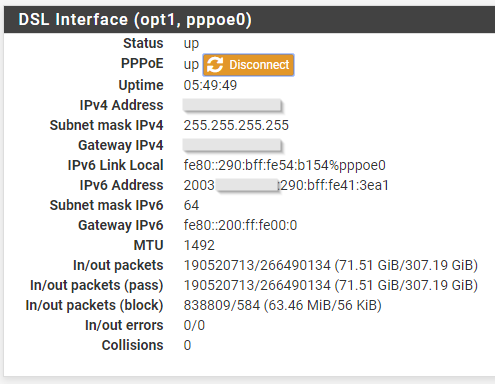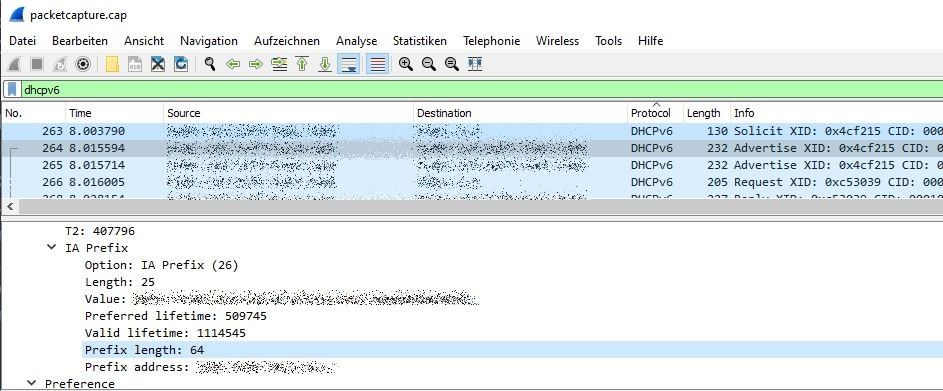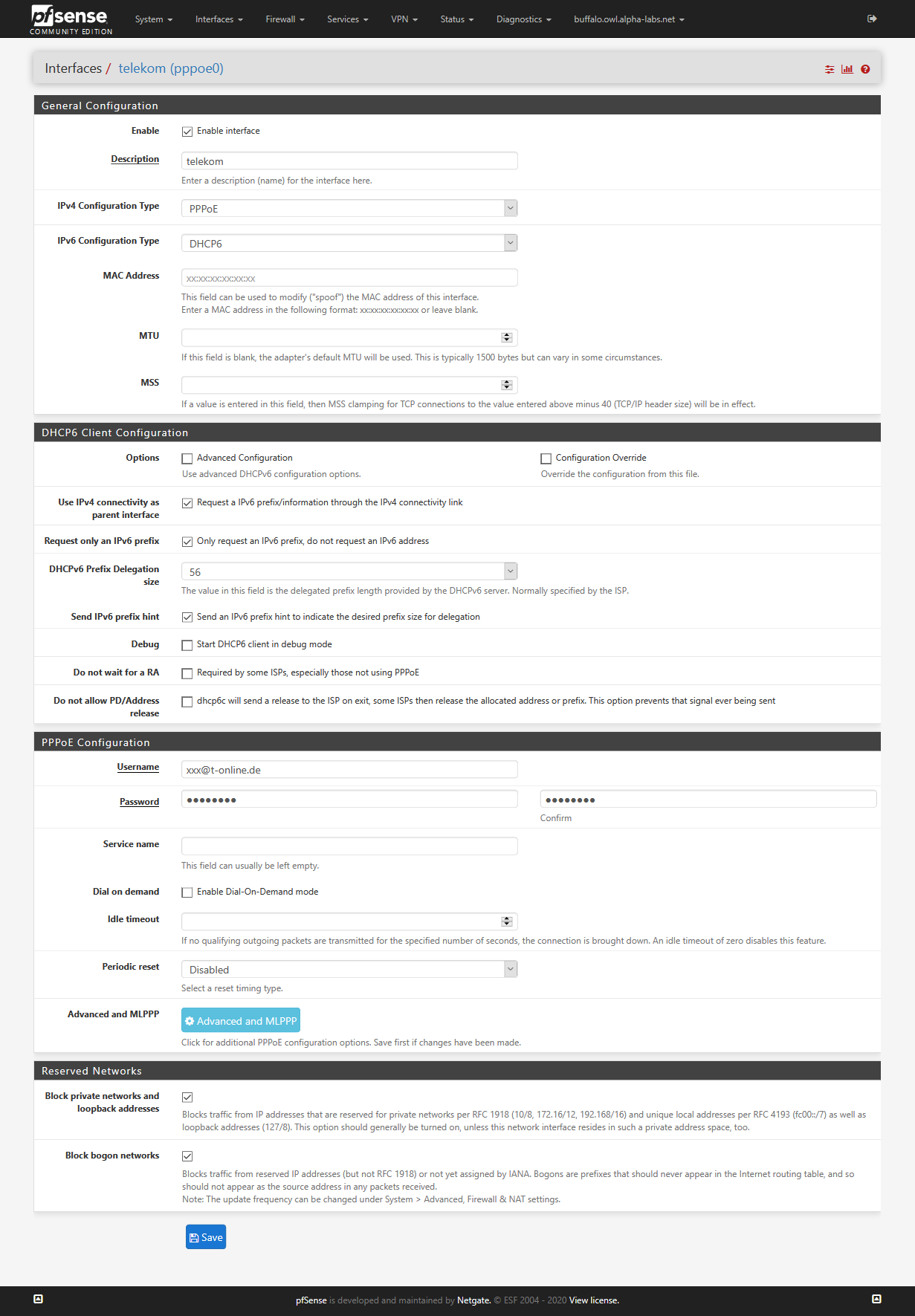IPv6, Telekom und Delegation Size.
-
Achso, ja. Ne.
Per default ist das auf "0", aber ich habs mit 1, 2, 4 und 10 probiert:
Feb 22 12:21:28 buffalo ppp: [opt3_link0] PPPoE: connection closed Feb 22 12:21:28 buffalo ppp: [opt3_link0] can't remove hook mpd34476-0 from node "[1aef]:": No such file or directory Feb 22 12:21:28 buffalo ppp: [opt3_link0] Link: DOWN event Feb 22 12:21:28 buffalo ppp: [opt3_link0] LCP: Down event Feb 22 12:21:28 buffalo ppp: [opt3_link0] LCP: state change Opened --> Starting Feb 22 12:21:28 buffalo ppp: [opt3_link0] Link: Leave bundle "opt3" Feb 22 12:21:28 buffalo ppp: [opt3] Bundle: Status update: up 0 links, total bandwidth 9600 bps Feb 22 12:21:28 buffalo ppp: [opt3] IPCP: Close event Feb 22 12:21:28 buffalo ppp: [opt3] IPCP: state change Opened --> Closing Feb 22 12:21:28 buffalo ppp: [opt3] IPCP: SendTerminateReq #4 Feb 22 12:21:28 buffalo ppp: [opt3] IPCP: LayerDown Feb 22 12:21:28 buffalo ppp: [opt3] IPV6CP: Close event Feb 22 12:21:28 buffalo ppp: [opt3] IPV6CP: state change Opened --> Closing Feb 22 12:21:28 buffalo ppp: [opt3] IPV6CP: SendTerminateReq #2 Feb 22 12:21:28 buffalo ppp: [opt3] IPV6CP: LayerDown Feb 22 12:21:28 buffalo ppp: [opt3] IFACE: Down event Feb 22 12:21:28 buffalo ppp: [opt3] IFACE: Rename interface pppoe0 to pppoe0 Feb 22 12:21:28 buffalo ppp: [opt3] IPCP: Down event Feb 22 12:21:28 buffalo ppp: [opt3] IPCP: LayerFinish Feb 22 12:21:28 buffalo ppp: [opt3] IPCP: state change Closing --> Initial Feb 22 12:21:28 buffalo ppp: [opt3] IPV6CP: Down event Feb 22 12:21:28 buffalo ppp: [opt3] IPV6CP: LayerFinish Feb 22 12:21:28 buffalo ppp: [opt3] Bundle: No NCPs left. Closing links... Feb 22 12:21:28 buffalo ppp: [opt3] IPV6CP: state change Closing --> Initial Feb 22 12:21:28 buffalo ppp: [opt3_link0] LCP: LayerDownGleiches Spiel.
Ich bin nicht sicher, ob der wirklich eine ausreichende Allokation hat.-Christian.
-
So konfiguriert funktioniert das bei mir an einem Telekom Anschluss schon seit Jahren. Da scheint tatsächlich was mit dem Anschluss nicht zu stimmen.
-
Jepp,
ich sehe auch nichts, was ich falsch gemacht hätte. Kann man irgendwo sehen was die Telekom für eine Allocation rausgegeben hat?
-
Also wir haben letzten Freitag bei einem Kunden mit statischer IP4/6 und TCom DSL das WAN eingerichtet. Wir haben lediglich "Use IPv4 connectivity as parent interface" und "Request only an IPv6 prefix" mit /56er Prefix gesetzt, was mit Track Interface auf LAN problemlos funktioniert hat. DSL Interface hatte danach das versprochene externe v6 Prefix mit /64 und intern stand das /56 als Tracking (00-ff) zur Verfügung.
Grüße
-
@JeGr said in IPv6, Telekom und Delegation Size.:
DSL Interface hatte danach das versprochene externe v6 Prefix mit /64 und intern stand
Klugscheißversuch: Müsste es nicht /128 lauten?

-
Nope, das externe Interface bezieht sich via DHCP6 eine statische Adresse auf Grund der DUID. Die wird dann mit /64 aufgelegt. Warum sollte eine saubere v6 Adresse mit /128 auftauchen? Wäre dann nicht routbar und würde keinen Sinn ergeben. Auch wenn das Gateway via fe80::xyz läuft, ist der Upstream Router ja auch in diesem /64er Transfer Prefix drin.
-
@JeGr Zumindest meine IPv6 am WAN Interface hat eine Subnet Mask von 128. Wenn das nicht gemeint war, dann ist mein Versuch wohl missglückt.
-
@Bob-Dig said in IPv6, Telekom und Delegation Size.:
@JeGr Zumindest meine IPv6 am WAN Interface hat eine Subnet Mask von 128. Wenn das nicht gemeint war, dann ist mein Versuch wohl missglückt.

Nope, saubere /64 Delegation :)
-
@JeGr Interessant.
Dafür sieht bei mir die IPv4 Subnetmask so aus:
255.255.192.0Ist wohl alles Providerabhängig.
-
Vermutlich. Telekom hat bei PPPoE und v4 aber schon immer sowas gebastelt. Wohl mit ein Grund, warum bei DSL der Next-Hop grundsätzlich nie pingbar ist bei denen und man externe GWs zum Prüfen braucht.
-
Bei mir bekomme ich immer eine /64 Alloc, egal was ich mache. Seufz.
-
@creiss said in IPv6, Telekom und Delegation Size.:
Bei mir bekomme ich immer eine /64 Alloc, egal was ich mache. Seufz.
Die bekommst du auf dem getrackten Interface? Oder WO bekommst du die? Dass du auf dem WAN /64 hast oder auch per Track Interface ist völlig normal. Das heißt aber nicht, dass dir "nur" ein /64er zur Verfügung steht.
-
Feb 22 11:10:04 buffalo ppp: [opt3_link0] Link: reconnection attempt 2 in 1 seconds
Feb 22 11:10:05 buffalo ppp: [opt3_link0] Link: reconnection attempt 2
Feb 22 11:10:05 buffalo ppp: [opt3_link0] PPPoE: can't connect "[32c]:"->"mpd19150-0" and "[18e8]:"->"left": No such file or directory
Feb 22 11:10:05 buffalo ppp: [opt3_link0] can't remove hook mpd19150-0 from node "[32c]:": No such file or directory
Feb 22 11:10:05 buffalo ppp: [opt3_link0] Link: DOWN event
Feb 22 11:10:05 buffalo ppp: [opt3_link0] LCP: Down eventWeil ich sonst genau diese Fehlermeldung auch dem tracking interface bekomme und der Link abbricht. Gegenfrage: Wo kann ich sehen, welche Alloc T-Com wir bereitstellt?
-
Würde mich auch mal interessieren, was muss man wie capturen um eine definitive Antwort zu bekommen.
-
Warum capturen? Die Telekom macht die Ansage. Soweit mir bekannt bekommt auch laut RIPE Richtlinien ein Privatkunde eine Zuteilung von einem /56er IPv6 Segment. Ggf. größer, aber dann muss das kommuniziert werden - kann ja keiner hellsehen. Das hat ähnlich wie Zusatzdaten in deinem Kundencenter oder sonstwo hinterlegt zu sein. Bei Firmenkunden ist dem auch so, wie es bei privaten ist - leider keine Aussage da mir kein Anschluß zur Verfügung steht.

Edit: OK manchmal wohl auch knausriger mit einem /60 aber eher selten. Dafür bei Glas oder FTTH auch mal bei Nachfrage ein /48er. Aber wie gesagt, das wird im Normalfall kommuniziert.
-
@JeGr Bei mir wird da nix kommuniziert aber bin auch nicht bei der Telekom, konnte das durch ein capture jetzt auflösen, nur ein /64 prefix bei Telecolumbus.
Bin gerade stolz wie Bolle, das erste mal Packet Capture gemacht. Mit pfSense auf dem WAN-Interface und anschließend in Wireshark geladen. In Grün ist der Filter zu sehen und dann auf "Advertise XID" geklickt brachte die nötige Info zu Tage.

